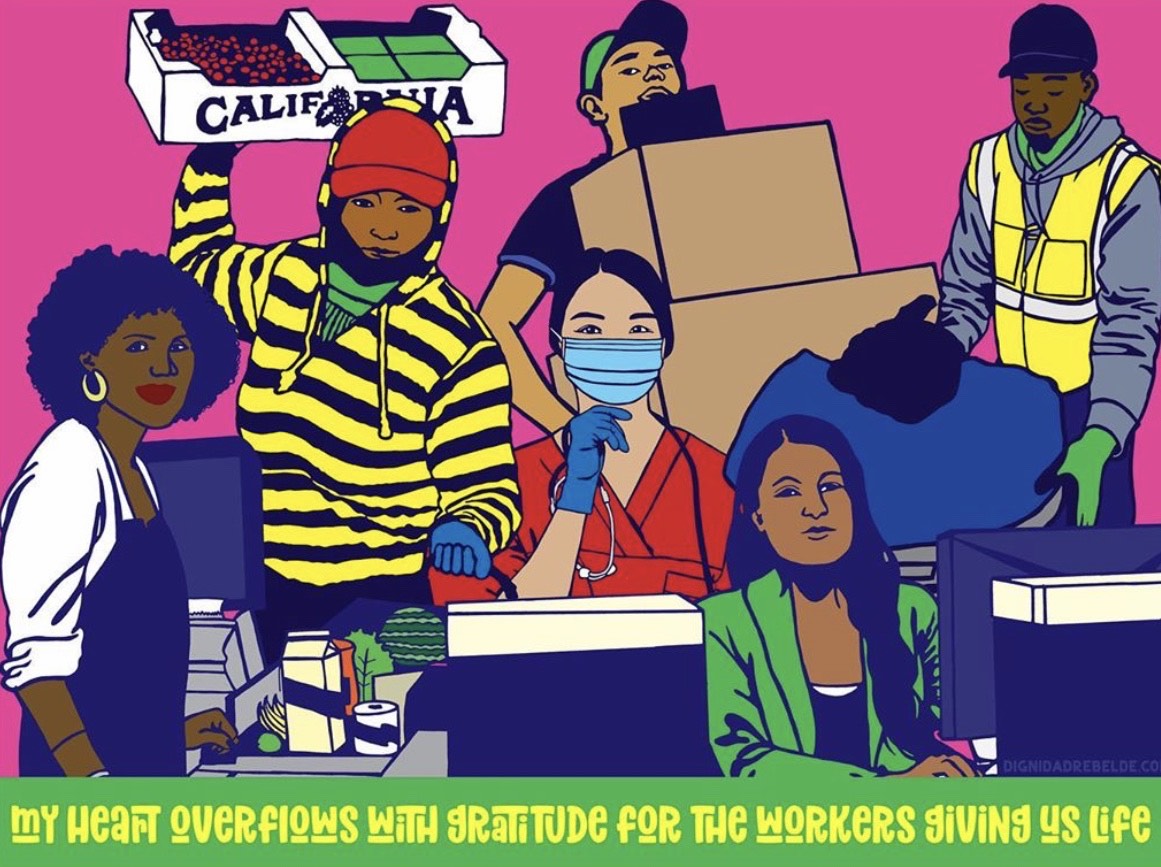“My heart overflows with gratitude for the workers giving us life.” Photo by Dignidad Rebelde.
By Brenda Verano, Staff Reporter
The coronavirus is an equal opportunity threat, making no distinction between rich, poor or anything and everything in between.
But there is a huge distinction in the economic repercussions of that threat: those who can afford it the least are often the ones who either have to keep working, or lack vacation or sick leave.
You can see it regarding this campus shut down, where CSUDH President Thomas A. Parham’s announced on March 17 that “employees who cannot perform their work remotely, will be placed on administrative leave with pay until further notice.”
That works for AJ Kapoor, a student worker at the research help desk in the campus library.
“I agree with everything the [administration] is doing, it is definitely a change of pace but it’s for the best,” Kapoor said. “Keeping students and faculty members safe from the virus is very important, not just for them but everyone too.”
But not all workers are as fortunate.
“I have no income coming in from CSUDH,” said a 1910 Cafe & Lounge employee who preferred to remain anonymous.”I support four people, two are children. I work 22 hours a week. I wish we could use our sick time. It would give us one more paycheck, this would show employees that we matter.”
That dichotomy is being played out across the state and the country. It’s one of parallel but grossly unequal universes, where Texas Sen. Ted Cruz gets $3,346 a week and $699 a day to be on paid sick leave, while the people who pick the crops and drive those crops to Whole Foods must work every day, putting themselves and their families at risk of contracting the disease.
California Gov. Gavin Newsom’s March 19 statewide order urging all Californians to stay at home to help\contain the spread of the coronavirus mentioned exemptions, such as businesses deemed essential like gas stations, pharmacies, grocery stores, convenience stores, takeout and delivery restaurants, and laundromats.
But while we all benefit from those essential businesses remaining open, what about the people who have to work at those jobs, who don’t have the luxury of staying at home and working or who don’t have jobs with paid sick leave that allow them to stay home? Who are those people?
In the greater Los Angeles area, the people working at the convenience stores or restaurants cooking the food that is then delivered to our doors, are predominately people of color. And the majority of the farmworkers in the state who are putting food on our table are undocumented.
These are people in the front line of a fight we are all in, but they can’t afford to stay home, take a sick day, or quarantine themselves because they live paycheck to paycheck.
Is being an essential worker a synonym for someone who has to risk their health? Who has to choose between paying rent or risking infection?
I see constant tweets where people are saying “everyone needs to stay home,” but what about street vendors, or bus drivers, or women in the garment industry who get paid cents for every piece of clothing they sew, or the clerks in the mom-and-pop shops that remain open for you after Whole Foods runs out of your favorite quarantine snacks?
If your current job is considered “essential” and you’re still waking up, leaving your home and family and clocking into work during this pandemic, thank you for what you’re doing for the rest of us. Your position deserves a living wage (and in all honesty a raise), health benefits along with hazard and sick leave pay.
For the rest of us who are able to stay in quarantine, stay home. Support local and small businesses. Take care of yourselves and your families.
And when this darkness lifts and if the government once again ignores these workers who kept this nation operating, make sure to remember them, open your arms, shield them with your support and thank them. Thank them for reminding us that some things like paid sick leave should be a human right, not a privilege.
And thank them for their service, the kind that doesn’t get medals or retirement plans but does help the rest of us. For in a time that seems so unimaginable, they are risking their lives so that ours can be a touch more bearable.

